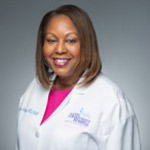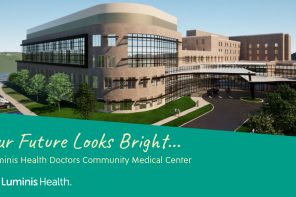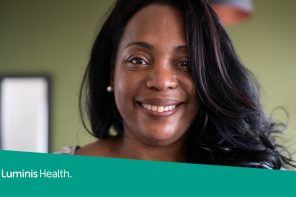October is Breast Cancer Awareness Month and it’s the perfect time to focus on the importance of breast cancer screening for all women. It is especially important for residents of Prince George’s County, where there is a higher rate of late-stage breast cancer diagnosis and mortality rates. This month is also an opportunity to highlight all of the wonderful progress made in breast cancer treatments.
COVID-19 had an impact on breast cancer screening frequency during and after the pandemic, with the American College of Radiology (ACR) finding that mammogram screenings dopped by 63.7 percent compared to pre-pandemic numbers. Screening exams at our Lanham site are approximately 30 percent lower than pre-pandemic levels. This is especially concerning given that early breast cancer diagnosis is the key to better survival rates.
When You Should Get Screened
Sometimes women are unsure when they should start getting screened for breast cancer. The recommendation is for yearly mammograms starting at age 40. If there is family history of breast cancer, then it is recommended to start ten years prior to the age your family member was diagnosed. For example, if the mother was age 42 at diagnosis, the daughter should start getting mammograms at age 32 and enroll in a high-risk breast screening program.
The ACR has recognized that African American and Jewish women are at a high risk for breast cancer. These women should get a risk assessment and consider starting early breast cancer screening at age 30
Be Your Best Advocate
Early breast cancer is best diagnosed when there are no symptoms and there is only a small abnormality on imaging. There are some women who feel a lump, but it does not always mean they have cancer. There are many non-cancerous problems that cause a lump in the breast. If a woman feels something different from their normal, they should get it checked out by their physician.
It is important for women with dense breasts to ask for 3D mammograms because they are the best imaging for evaluating dense tissue. Women should look closely at their imaging report and be self-advocates: if you are identified as having dense breasts, ask for additional tests, such as ultrasound or MRI. This is especially important if you feel a lump and the report comes back as “normal.”
A mammogram isn’t the most comfortable test, but it is quick and provides valuable information. With the newer machines, the compression releases as soon as the picture is taken. It is recommended that patients take an over-the-counter pain reliever about two hours prior to their mammogram. A few minutes of discomfort are preferable to a long process of treatments for breast cancer.
Pink Ribbon Rally Welcomes You
On Friday, October 14, Luminis Health Doctors Community Medical Center will host a special Pink Ribbon Rally event on its Lanham campus to help take the fear and mystery out of getting a mammogram. There will be music, dancing and learning, as well as discussion about how mammograms are performed, breast self-awareness and treatment, and advocating for your own health.
Hear from breast cancer survivors who share their journey, and even discuss proper bra fit. Join in on the discussion about gynecologic problems such as fibroids, menopause, uterine cancer, etc.
The event runs from 8 am to 3 pm. Women who are unable to get screened at the rally can make an appointment to come back at a later date—Luminis Health performs mammograms year-round.
This article was originally published with the Enquirer-Gazette.
 Dr. Regina Hampton is the medical director of the breast care center at Luminis Health Doctors Community Medical Center. A board-certified general surgeon who has focused her practice on breast health and breast cancer, she has been ranked by her peers as one of the top breast cancer surgeons in the Washington, D.C. area.
Dr. Regina Hampton is the medical director of the breast care center at Luminis Health Doctors Community Medical Center. A board-certified general surgeon who has focused her practice on breast health and breast cancer, she has been ranked by her peers as one of the top breast cancer surgeons in the Washington, D.C. area.




